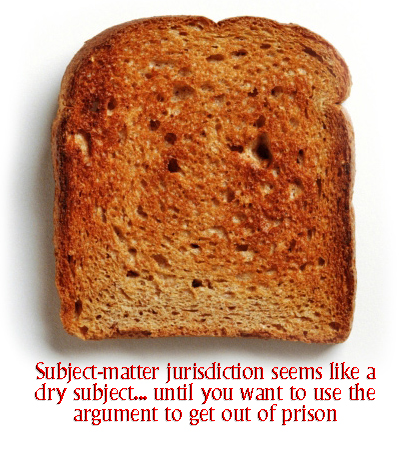We post news and comment on federal criminal justice issues, focused primarily on trial and post-conviction matters, legislative initiatives, and sentencing issues.

SUBJECT MATTER JURISDICTION AIN’T WHAT YOU THINK
 Over 25 plus years of post-conviction work, I can’t count the number of inmate-written post-conviction motions I have seen claiming that a district court lacked subject-matter jurisdiction over their cases. What I can count is the number of times the claim has worked. That would be zero.
Over 25 plus years of post-conviction work, I can’t count the number of inmate-written post-conviction motions I have seen claiming that a district court lacked subject-matter jurisdiction over their cases. What I can count is the number of times the claim has worked. That would be zero.
Subject-matter jurisdiction is a pretty dry topic, but it is a basic concept that should be understood by your basic high school government class student. Other than the Supreme Court, which was established in the Constitution, all federal courts are creatures of statute. That is to say, those lower courts exist only because Congress passed a law saying they exist. Congress could eradicate everything from the courts of appeal down to federal magistrate judges (who aren’t really judges, but that is a matter for another day) simply by passing a law doing so. Of course, the President would have to sign, but given the fits federal judges have given Mr. Trump in enjoining many of his prized initiatives, it’s a safe bet he’d find his pen real fast.
Because lower federal courts are creatures of statute, Congress is allowed to dictate what issues they may hear and not hear. That’s called subject-matter jurisdiction. This much-abused concept arises often in civil suits, and occasionally in post-conviction matters. But as a matter of a criminal conviction, subject-matter jurisdiction is easy and straightforward. The question boils down to this: Is the defendant accused of violating a federal criminal statute? If, yes, the district court has subject-matter jurisdiction under 18 USC § 3231. If no, the district court may not.
Most defendants raising subject-matter jurisdiction claim some defect is jurisdictional when it isn’t. The First Circuit reminded Daniel Carpenter of that last week. Dan had been sentenced and filed a notice of appeal. While the appeal was pending, the district court issued a forfeiture order. Dan argued that because he had filed his notice of appeal, the district court lacked subject-matter jurisdiction to issue any further orders in his case.
 The 1st said Dan’s “use of the term ‘subject matter jurisdiction’ is a misnomer here.” While he may not have known it, Dan was really relying on what is known as the “appellate divestiture” rule. That rule holds that the filing of a notice of appeal “divests the district court of its control over those aspects of the case involved in the appeal,” but it does “not divest the district court of all authority.”
The 1st said Dan’s “use of the term ‘subject matter jurisdiction’ is a misnomer here.” While he may not have known it, Dan was really relying on what is known as the “appellate divestiture” rule. That rule holds that the filing of a notice of appeal “divests the district court of its control over those aspects of the case involved in the appeal,” but it does “not divest the district court of all authority.”
The appellate divestiture rule is not jurisdictional, the Circuit said. Rather, it “is rooted in concerns of judicial economy, crafted by courts to avoid the confusion and inefficiency that would inevitably result if two courts at the same time handled the same issues in the same case. Application of the divestiture rule is not mandatory and efficiency concerns are central to determining whether we should apply it here.”
In this case, the district court said at sentencing that a forfeiture proceeding would be held later. Thus, the Circuit said, “forfeiture was a certainty; the only question was the amount.” Because there would be no point to a remand, inasmuch as the forfeiture order had issued, the divestiture rule did not block the forfeiture order.
United States v. Carpenter, 2019 U.S. App. LEXIS 31113 (1st Cir. Oct 18, 2019)
– Thomas L. Root

